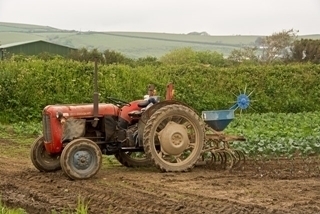“There is a real possibility that international supply chains will collapse … the best way to protect against this risk is to diversify and localise the sourcing of food.”
.
The current situation is throwing up all sorts of prognoses about the production and distribution of food.
 From the VGS news pages:
From the VGS news pages:
How to plug the migrant labour gap in farming
The future of the farming and food industries
Sidmouth businesses providing more services
.
On the one hand, a more fractured world might force a more localised food-industry to emerge:
“That requires a growing focus on domestic food self-sufficiency, and domestic market bases for manufactured goods and services.”
The Shadow War Playing Out Behind The COVID-19 Crisis | oilprice.com
.
On the other, new habits forged in the current crisis might be seen as an opportunity for the localisation of food production:
.
Four Ways COVID-19 will Change Food Systems and Food Security
It’s a once-in-a-generation opportunity to use the same amount of money to either fund a transformative health-promoting economy, environment, and society …. or one dependent on environmental pollution and social inequality. Whatever happens, we can be prepared for food impacts of the coronavirus pandemic by asking the following four questions:
- What will the likely impacts be on individual behaviors affecting food?
- … on changes in collective behavior and popular culture affecting food?
- … on institutional changes affecting food?
- … on infrastructures and public policies affecting food?
Four Ways COVID-19 will Change Food Systems and Food Security | resilience.org
.
Building Resilience into our Food Systems
Many countries, the UK amongst them, have come to depend heavily on imported food and therefore on the resilience of food systems in other countries as well as our own. Food chains have become extremely long, with consumers and producers kept far apart. This creates an inherent vulnerability in the system. One break in the chain and the whole thing falls apart. SFT chief executive, Patrick Holden, wrote about this in his recent blog on the coronavirus outbreak.
Resilience is the cornerstone of a sustainable food system. The FAO defines resilience as: ‘
The ability to prevent disasters and crises as well as to anticipate, absorb, accommodate or recover from them in a timely, efficient and sustainable manner. This includes protecting, restoring and improving livelihood systems in the face of threats that impact agriculture, nutrition, food security and food safety.’
Concern about the food system has been growing for a number of years now, as the impact of climate change has become unavoidably apparent. As instances of extreme weather events and global temperatures have risen, farmers have been increasingly focused on how to adapt food systems to improve resilience and help address those challenges…
The shift towards relocalisation and re-territorialisation of food systems must be seen not as a threat but as an opportunity for fairer and more sustainable food systems.” A position that Patrick Holden and the SFT have long supported.
To achieve this shift there needs to be Government action to build on the pioneering work of farmers, growers and local food campaigners who have developed a range of successful ways to market food locally. But we now need concerted action to achieve shorter, fairer and cleaner supply chains nationally…
The UK needs to support smaller scale producers and local food systems in order to reverse the growing trend of consolidation within the sector, because having a more varied farming sector builds greater resilience into our food system. As Professor Tim Benton said, “There is a real possibility that international supply chains will collapse … the best way to protect against this risk is to diversify and localise the sourcing of food.”
Building Resilience into our Food Systems | resilience.org
.
Grow for Victory: how Britain can boost food resilience
The wartime generation digested the message “Dig for Victory” and responded with gusto, halving Britain’s reliance on food imports by the early 1940s. Now that our resilience is being tested once again – as a nation, as communities, as households – it is natural to wonder whether there are lessons to learn from the past.
When it comes to responding to Coronavirus, the singular priority of today’s political and civic leaders is to manage the present emergency. We should all be grateful that they are doing this – but the time will come when we have to consider a more delicate, humble future for the country, and that’s where a glance to the past is merited.
There will doubtless be calls for wholesale change, from the value we assign to those who keep us healthy and safe, to the very definition of “critical” infrastructure and “luxury” goods.
In this re-examination after the crisis I’ll be among those calling for the spotlight to be cast upon our national food systems. After setting out five years ago to disrupt Britain’s inadequate food supply chains, it now strikes me that our nation has moved very far from the ethos of Digging for Victory.
Yet the transformation of British farming coming via Brexit, our desire for healthier diets, our commitment to achieving net zero emissions, and now the impact of coronavirus, means that we must now take a new approach. All these developments point logically to a significant uptick in British food production.
…
Grow for Victory: how Britain can boost food resilience | reaction.life